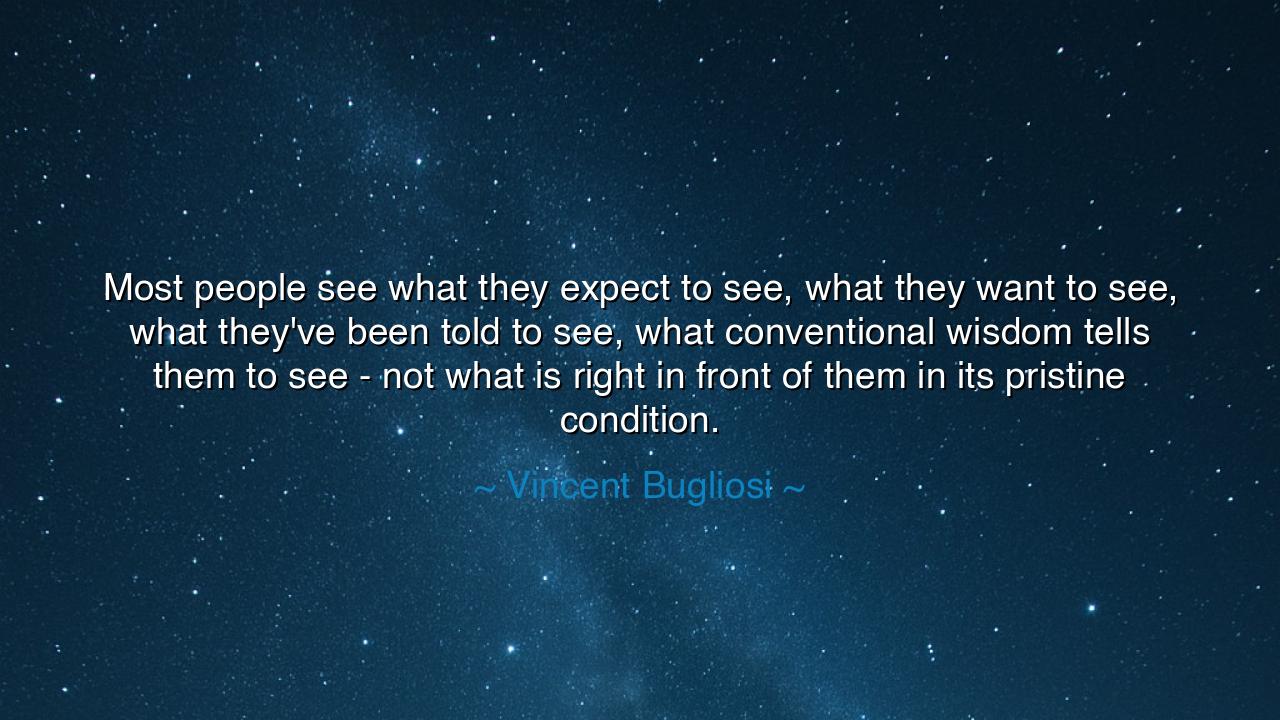
Most people see what they expect to see, what they want to see
Most people see what they expect to see, what they want to see, what they've been told to see, what conventional wisdom tells them to see - not what is right in front of them in its pristine condition.






Vincent Bugliosi, sharp-eyed seeker of truth in the courtroom of men, declares: “Most people see what they expect to see, what they want to see, what they’ve been told to see, what conventional wisdom tells them to see—not what is right in front of them in its pristine condition.” In these words he unmasks a deep weakness of the human soul: the blindness born not of darkness, but of desire and habit. For our eyes are not free; they are shaped by expectation, by conventional wisdom, by the illusions others weave for us. Rare is the man who sees reality as it truly is, unclouded, untainted, in its pristine condition.
The ancients spoke of this blindness in their myths. The Greeks told of Narcissus, who, gazing upon the water, did not see the truth of life around him but only the reflection of his own desire. His downfall was not the absence of sight, but the refusal to see beyond himself. So too, Bugliosi reminds us that many look at the world and see only their longings, their fears, or the stories they have been told, never piercing through to truth.
History gives us a powerful witness in the tale of Galileo. When he pointed his telescope to the heavens, he saw the moons of Jupiter circling their planet. The evidence was clear, yet the scholars of his age refused to see. They clung to what they had been told to see, chained by conventional wisdom. Their blindness was not in their eyes but in their minds. Galileo, willing to see with innocence and courage, found truth in its pristine condition—and paid the price for it.
Bugliosi, as a prosecutor, knew well how this blindness shaped justice. Jurors and judges, if unguarded, saw not the evidence but what they expected, or what society whispered into their ears. His words are a warning: if we do not train ourselves to look beyond expectation, beyond the noise of the crowd, we will forever mistake illusion for reality. The cost of such blindness is not only personal error, but the ruin of justice and the loss of truth.
Let the generations remember: to see truth requires courage. To strip away desire, tradition, and fear is to stand naked before reality, beholding it as it is. Few will choose this path, for it demands humility and strength. Yet he who learns to see with clear eyes, beyond the veil of conventional wisdom, becomes free—free to know, free to act, and free to walk in harmony with what is. And this freedom is the beginning of true wisdom.






DLVan Dinh Le
This statement resonates deeply with me because it challenges the reliability of perception. If people mostly see what they want or expect, it implies that misunderstanding and conflict are almost inevitable. But it also makes me wonder whether complete clarity is achievable, or if all perception is inherently subjective. Could mindfulness or conscious reflection help bridge this gap between perception and reality, or are our minds wired to distort even the most direct experiences?
KNNguyen Thi Khanh Ngoc
Reading this makes me wonder about the role of education and critical thinking. Are we taught to see objectively, or are we conditioned to accept conventional wisdom without question? How much of our perception is genuinely our own, and how much is inherited from societal norms? It also raises a practical question: in decision-making, research, or even daily life, how can we ensure that we’re responding to reality itself rather than our expectations or biases?
HGHuy Gia
I find this perspective both unsettling and enlightening. It suggests that our understanding of the world is shaped more by assumptions and cultural narratives than by direct observation. Could this be why misinformation spreads so easily, because people interpret facts through the lens of what they already believe? I’m curious how one might cultivate the ability to see things in their unfiltered state, especially in an era dominated by social media and echo chambers.
DHNguyen duc hoanh
This idea makes me question how often my own perceptions are filtered by bias, expectations, or societal conditioning. If most people don’t truly see things as they are, how can we trust our judgment or decisions? I wonder whether it’s even possible to experience reality without these mental filters. Does this mean that objectivity is largely an illusion, or are there ways to train ourselves to perceive things more accurately and authentically?